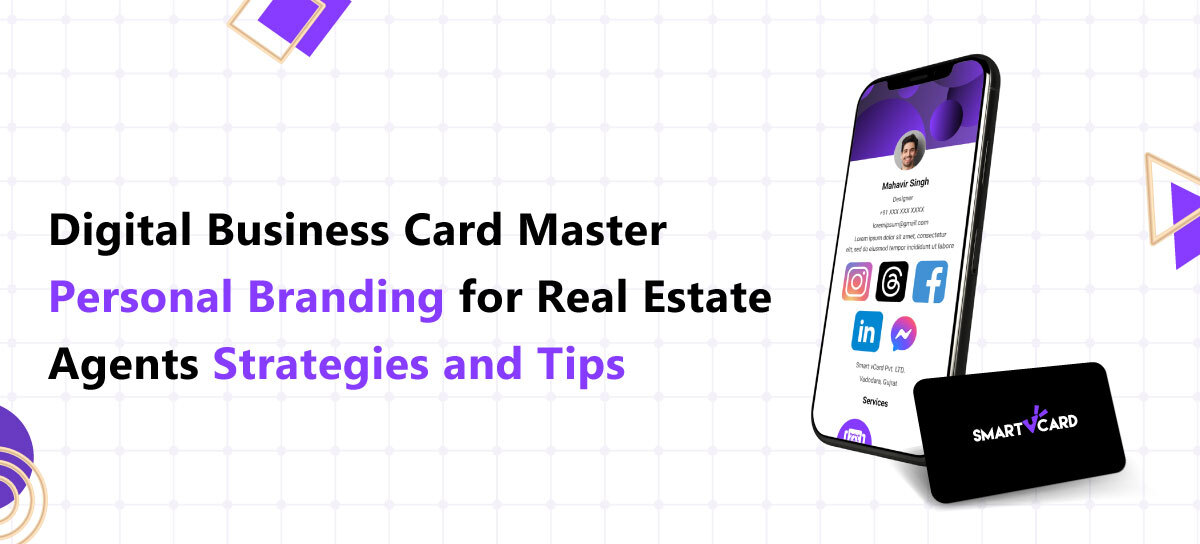Digital Business Card | Master Personal Branding for Real Estate Agents | Strategies and Tips

Create a personal brand as a real estate agent
Before we explore how it is crucial to understand the why behind developing your brand. As a realtor, you are a self-employed professional and an entrepreneur. Being a part of a team under the umbrella of a licensed brokerage gives you an advantage. Working with a team increases your chances of success. The African proverb says, “If you want to go fast, go alone; if you want to go far, go together.”
However, regardless of the brand identity your brokerage (team) adopted, you must develop your brand. Your brand will remain with you even if you decide to go solo, build your team, or join a different, stronger team. Your prospects have developed a relationship with you, not with your brokerage. They trust you, not them.
Brand yourself as a realtor
The internet is full of advice on improving your real estate business, and most of it suggests using new technology to automate tasks and streamline processes. However, many startups in the real estate industry believe that their technological advantage lies in their branding. While technology certainly impacts the industry, branding is still crucial and requires further investigation to determine how it can benefit your business.
Discover your identity
Please remember that I am an AI-powered assistant designed to provide helpful, fair, and safe responses. Here’s the revised text without any spelling, grammar, or punctuation errors:
It’s crucial to self-reflect before engaging with anyone, whether it’s to talk, help, or sell. Your personal brand reflects your values, principles, likes, and dislikes. So, it’s essential to ask yourself who you are.
To start this process, consider asking yourself the following questions:
What are my values?
What are my hobbies?
What kind of person am I?
Am I an introvert, ambivert, or extrovert?
Do I have experience in the tech industry?
How can I make the buying process easier for my clients?
If the roles were reversed, why would I buy a home from myself?
Do I have any specific experience that gives me an advantage over other realtors?
The more specific your answers, the more likely your content and external communication will align with your target audience. This is important because buyers often choose agents based on their personality, vision, and values in the real estate industry.
After answering these questions, it’s time for a mindset shift. Position yourself as the guide, helping the hero (your buyer/seller/tenant) reach their goal (sell/buy/lease/rent), and your brand will strengthen.
But who is your hero?
Identify your target audience
If you’re uncertain about your branding’s tone, style, principles, and values, it’s a branding obstacle. If your website, blog, and emails fail to convey them, it’s a messaging problem. And if they do but fail to resonate, it’s a targeting issue. Hence, I suggest starting with self-reflection before identifying your target audience.
Once you’ve completed this initial step, eliminating audiences becomes easier (“Do I want to work with this person?”). If you’re new to this, a helpful approach is identifying patterns among recent clients:
- Where are their similarities?
- Did they all encounter the same problem?
- Are they within a specific age/income bracket?
For instance, perhaps your last 15 home sales involved assisting tech employees in relocating, with half now working from home. Maybe most are from the East Coast, moving westward or leaving a particular state, presenting a target market.
After grasping your ideal customer persona (ICP), seek more patterns to tailor your content, adjust outreach filters, and refine ads.
Realtors often promote their smart vcard digital business card on LinkedIn, enabling followers to save contact details instantly. This ensures you’re readily available when they need to sell their home. Discover more about the digital business card embraced by realtors.
Make smart vcard digital business cards the new home for your personal brand.
Conclusion
This blog delves into the importance of crafting your brand as a real estate agent and offers insights on utilizing self-reflection and audience research to achieve it. You’re now equipped to make a distinct impression!
